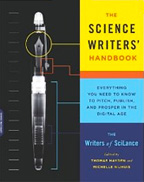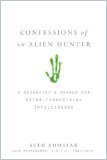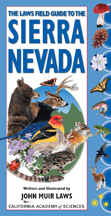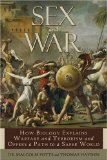Check out these great books, many of which are by Ask a Scientist speakers:
The Science Writers' Handbook: Everything You Need to Know to Pitch, Publish, and Prosper in the Digital Age, Thomas Hayden and Michelle Nijhuis, Editors Want to be a science writer? This indispensable guide covers topics such as finding and crafting a story, working with multimedia, pitching to publications, dealing with emotional issues like isolation and envy, understanding business structures, negotiating contracts, being profitable, and handling ethical matters. |
|
Confessions of an Alien Hunter: A Scientist's Search for Extraterrestrial Intelligence, Seth Shostak Shostak, senior astronomer at SETI, offers an insider's view on the search for extraterrestrial life. What might we found out there? And how might we find it? Shostak reports on the history, politics, and of course science, involved in what might be humankind's most captivating and exciting endeavor. |
|
The Laws Field Guide to the Sierra Nevada, John Muir Laws For six years, John Muir Laws backpacked the Sierra Nevada to research and illustrate this pocket size field guide to over 1,700 species found in the Sierra Nevada. Includes 2,710 original watercolor paintings that help botanists identify the insects that come to their flowers, birders identify the trees in which the birds perch, and hikers name the stars overhead at night. |
|
Sex and War: How Biology Explains Warfare and Terrorism and Offers a Path to a Safer World, Malcolm Potts and Thomas Hayden Why do humans have a natural inclination to band together and kill off members of our own species? Potts and Hayden assert that the answers lie in our biological history — that aggression against our own speciesis rooted in deep evolutionary impulses and predispositions. Learn why we humans fight, and what we may be able to do about it. |
|
Parasite Rex: Inside the Bizarre World of Nature's Most Dangerous Creatures, Carl Zimmer A whole book about parasites? YES! Zimmer informs, delights, and disgusts, describing creatures that are among the world's most successful and sophisticated organisms. If you like horror movies, you'll love learning about how parasites can change DNA, rewire the brain, make men more distrustful and women more outgoing, and turn their hosts into the living dead. |
|
Riddled with Life: Friendly Worms, Ladybug Sex, and the Parasites That Make Us Who We Are, Marlene Zuk Zuk, a UC biology professor, describes how the pathogens that live amongus and inside of us have shaped who we are, evolutionarily speaking, as humans. Not for the squeamish, this funny and fascinating book will horrify, entertain, and enlighten the inquisitive reader. |
|
The Math Instinct, Keith Devlin We're all natural-born mathematicians. In fact, our innate math instinct is so hardwired that even newborn infants can detect errors in simple calculations of addition and subtraction. Devlin discusses the natural number sense that allows dogs to catch frisbees, bees to build honeycombs, birds to migrate, and ants to navigate. Also by Devlin: The Math Gene, The Millennium Problems, Mathematics: The Science of Patterns, Life by the Numbers, and many more. |
|
Sense and Goodness Without God: A Defense of Metaphysical Naturalism, Richard Carrier Is it possible to make sense of the universe, of our lives, of good and evil — without God? Historian and philosopher Carrier argues from empirical and scientific evidence that there is probably only a physical, natural world without gods or spirits, but we can still live a life of love, meaning and joy. |
|
The Symbolic Species: The Co-Evolution of Language and the Brain, Terrence Deacon This book begins with a question posed by a 7-year-old child: Why can't animals talk? Or, as Deacon puts it, if animals have simpler brains, why can't they develop a simpler form of language to go with them? Thus begins the basic line of inquiry for this breathtakingly ambitious work, which attempts to describe the origins of human language and consciousness. |
|
The Mind of a Mnemonist: A Little Book about a Vast Memory, A. R. Luria Readers of Oliver Sacks will recognize references to this early 20th century book by A. R. Luria, in which the distinguished Soviet psychologist documents his study of a man who had a literally limitless memory. Luria analyzes the subject's astonishing capacity for recall, his unique construction of the world, his mental strengths and weaknesses, and his unusual behavior and personality. |
|
Blue Cats and Chartreuse Kittens: How Synesthetes Color Their Worlds, Patricia Duffy Synesthesia is a perceptual condition in which there is an involuntary blending of one or more of the senses — for example, the associating of colors with numbers and letters. Even stranger, a synesthete might see moving blobs of color when tasting foods, or taste specific flavors upon hearing certain words, or hear music when looking at the reflection of trees in a lake. Read on! |
|
Ants at Work: How an Insect Society is Organized Deborah Gordon "The basic mystery about ant colonies," asserts Stanford professor Gordon, "is that there is no management." So if they don't work like a miniature human society, how do they exhibit such high degrees of organization? Gordon, who has been researching ants for 20 years, proposes a number of interesting answers in this informative, friendly, and good-humored book. |
|
Earthquake Days: The 1906 San Francisco Earthquake & Fire in 3-D, David Burkhart Just minutes after the 1906 earthquake, photographers began documenting its aftermath. A few had special 3-D cameras, enabling them to captur"stereo views" of the catastrophic scene. California-born historian Burkhart retells the story of the infamous day through these rare and beautiful images (as well as newspaper accounts, personal narratives, lithographs, maps, and more). 3-D viewer is included! |
|
A General Theory of Love, Thomas Lewis, Fari Amini, Richard Lannon What's behind romantic attraction? Why do parents love their children? Can pets really improve our physical well being? Why does loneliness hurt? Learn about the evolution of the psychobiology of love, and how love determines our moods, stabilizes and maintains our health, and actually changes the structure of our brains. |
|
Extreme Weather: A Guide and Record Book, Christopher Burt Hey, any weather lovers out there? This book is a must. In fact, even if you hate reading you'll enjoy the amazing photographs: snowstorms, floods, rain forests, red deserts, thunderclouds, lightning bolts, and tornadoes that might actually make you run for cover. If you like reading, all the better. |
|
Becoming a Tiger: How Baby Animals Learn to Live in the Wild, Susan McCarthy When it comes to all of us animals, some of our behaviors are instinctual and some are learned. In this funny and fascinating study of animal behavior and biology, McCarthy (coauthor of the bestselling When Elephants Weep) writes about Nature and Nurture's greatest collaboration: turning baby animals into skilled, thriving adults. |
|
Stiff: The Curious Lives of Human Cadavers, Mary Roach In this fascinating and hilarious bestseller, Mary Roach tells us how our dearly departed have helped us make strides in plastic surgery, crime solving, and guillotine technology, to name just a few examples. Curious about human composting, full body (or head, depending on how you want to look at it) transplants, and cannibalism? Read this book! |
|
The Geneticist Who Played Hoops with My DNA...And Other Masterminds from the Frontiers of Biotech, David Ewing Duncan Throughout history, cutting-edge scientists have astonished us with their brilliance, audacity, and often larger-than-life personalities. This collection of biographical studies introduces seven biotech pioneers and explains how their incredible work is altering life as we know it. Bonus: the Ask a Scientist series is mentioned! |
|
Sex, Time, and Power: How Women's Sexuality Shaped Human Evolution, Leonard Shlain Why did big-brained Homo Sapiens suddenly emerge some 150,000 years ago? Dr. Shlain, Chairman of Laparoscopic Surgery at CPMC in San Francisco, presents the theory that profound alterations in female sexuality hold the key to this mystery. Shlain is also the author of the bestselling Art & Physics and The Alphabet Versus the Goddess. |
|
A Beginner's Guide to Constructing the Universe: Mathematical Archetypes of Nature, Art, and Science, Michael Schneider The universe may be a mystery, but it's no secret! Discover how the samefew beautiful patterns of mathematics appear over and over again in nature, mythology, religion, science, art, and architecture. You may use numbers and see shapes every day, but you'll never look at them the same way again. |
|
Space, Objects, Brains and Minds (Essays in Cognitive Psychology), Lynn Robertson Lynn Robertson has been studying how brain lesions affect spatial abilities for over 20 years, and her work has revealed some surprising facts about space and its role in visual perception. In this book she explores the cognitive and neural basis of spatial representations and their contributions to spatial awareness, object formation, attention, and binding. |
|
More Than Human: Embracing the Promise of Biological Enhancement, Ramez Naam Blood transfusions, organ transplants, vaccinations, and in vitro fertilization were all at one time, by some people, considered sins against nature. Now we're facing a whole new set of scary-sounding technologies like genetic engineering, cloning, and brain-computer interfaces. Naam walks his readers through a tour of these incredible innovations, encouraging us to embrace, rather than fear them. |
|
Bad Astronomy: Misconceptions and Misuses Revealed, from Astrology to the Moon Landing "Hoax", Phil Plait Cosmic myth buster Plait sets the record straight on celestial misconceptions (toilets flush the other way in the southern hemisphere; you can only stand an egg on its end on the vernal equinox; etc) and also explains basic concepts like the big bang and why the sky is blue. Plait's website was chosen by Scientific American as one of the top five astronomy sites in 2004. |
|
The Selfish Gene, Richard Dawkins Richard Dawkins's brilliant reformulation of the theory of natural selection has helped change the whole nature of the study of social biology. In this now classic bestseller, Dawkins describes the world of the selfish gene: competitive, ruthless, deceitful, and sometimes altruistic. You can hardly find a modern book about genetics that doesn't refer to this work. |
|
Genome: The Autobiography of a Species in 23 Chapters, Matt Ridley This entertaining page-turner elucidates some of the more fascinating genetic discoveries recently uncovered by the Human Genome Project and other research. Focusing on one particularly interesting gene per chapter, Ridley discusses evolution, behavior, personality, human nature, sex, politics, intelligence, disease, cures of the future, and much more. |
|
The Red Queen: Sex and the Evolution of Human Nature, Matt Ridley Why do we have sex? Aside from the more obvious and immediate reasons, Ridley explains the current biological theories in his usual exciting, entertaining, readable style. Anyone curious about human nature simply must read this book, a truly thrilling ride of self-discovery that covers a range of fascinating topics from parasites to polygamy. (And words starting with other letters too.) Also by Ridley: Nature Via Nurture, The Agile Gene, The Origins of Virtue. |
|
The Man Who Mistook His Wife For A Hat, Oliver Sacks This ought to be required reading for anyone who...ok, for everyone. In his now-classic book, the brilliant neurologist describes case histories of patients suffering almost inconceivably bizarre neurological disorders. Dr. Sacks probes the mysteries of the mind with insight, compassion, and a beautiful and compelling writing style. You can't NOT read this book! |
|
An Anthropologist on Mars: Seven Paradoxical Tales, Oliver Sacks Read more clinical tales from Dr. Oliver Sacks, studies that are as fascinating as they are edifying. The conditions that Dr. Sacks writes about with such rare skill (including autism, Tourette's syndrome, and amnesia) help to illustrate the mysterious mental mechanisms that make us human. Really, just read all of his books: Uncle Tungsten, Awakenings, Seeing Voices, The Island of the Colorblind, and more. |
|
Phantoms in the Brain, V.S. Ramachandran and Sandra Blakeslee Named by Newsweek as one of the 100 most important people to watch in the next century, Ramachandran is a neuroscientist who has seen and solved cases that would make Oliver Sacks proud. (In fact Sacks wrote the foreword.) Several chapters deal with the fascinating matter of phantom limbs. You'll also learn about people who hallucinate cartoon characters, a woman who laughed herself to death, and much more. |
|
The Language Instinct: How the Mind Creates Language, Steven Pinker In this completely absorbing book, Pinker lucidly explains everything you always wanted to know about language: how it works, how children learn it, how it changes, how the brain computes it, and how it evolved. The study of this uniquely human instinct (in some ways hard-wired into our brains, and in other ways learned) provides exciting clues to solving the mysteries of the human brain. |
|
The Blank Slate: The Modern Denial of Human Nature, Steven Pinker According to Matt Ridley, this is "the best book on human nature that I or anyone else will ever read." Pinker describes and debunks the various dogmas that have been promoted throughout history to deny the existence of human nature. He clearly and compellingly shows that a biological basis for what makes us human is undeniable—and is not a threat to our humane values. Also by Pinker: How the Mind Works and Words and Rules. |
|
The Journey of Man: A Genetic Odyssey, Spencer Wells Examining the hidden secrets of human evolution in our genetic code, Wells reveals how developments in the revolutionary science of population genetics have made it possible to create a family tree for the whole of humanity. Using various genetic markers found on the Y chromosome, Wells traces the travels of man since the very early days of modern humans. |
|
Deadly Feasts: Tracking The Secrets Of A Terrifying New Plague, Richard Rhodes Pulitzer Prize-winning Rhodes follows virus hunters on three continents as they track a deadly new brain disease that first kills cannibals in New Guinea, then cattle and people in Britain and France. The story of prions, the infectious agent believed to cause "mad cow disease" and a handful of other equally gruesome degenerative disorders, unfolds like a mystery, thriller, and adventure story all rolled into one. |
|
Guns, Germs, and Steel: The Fates of Human Societies, Jared Diamond Why did some human societies invent agriculture, writing, and rocket ships, while others did not? This popular favorite and Pulitzer Prize-winner asserts that the uneven developments in technological progress around the world can be explained by a handful of factors related to geography. Also by Diamond: Why Is Sex Fun?, The Third Chimpanzee and the brand new Collapse. |
|
The Antibiotic Paradox: How the Misuse of Antibiotics Destroys Their Curative Powers, Stuart Levy, M.D. It is the certain fate of all antibiotics to be fought off eventually by the pathogens they target. But thanks to rampant misuse and abuse of these drugs, the process is accelerating — an alarming situation for public health officials as well as for anyone planning to get a potentially fatal infection. Learn about the history and future of antibiotics. |



































